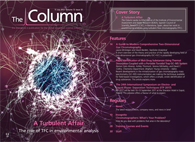Shigeru Terabe Receives Arnold O. Beckman Medal
Shigeru Terabe has received the Arnold O. Beckman Medal and Award for Outstanding Scientific Achievements in the Field of Electro-Drive Separation Techniques. The Sciex sponsored award was presented to Terabe as part of a Special Award Plenary Session at the 33rd International Symposium on Microscale Bioseparations (MSB 2017).
Shigeru Terabe has received the Arnold O. Beckman Medal and Award for Outstanding Scientific Achievements in the Field of Electro-Drive Separation Techniques. The Sciex sponsored award was presented to Terabe as part of a Special Award Plenary Session at the 33rd International Symposium on Microscale Bioseparations (MSB 2017).
A driving force in understanding the fundamentals of capillary electrophoresis, Terabe was also involved in the introduction of micellar electrokinetic chromatography and its myriad of applications.
“This annual medal and award sponsored by Sciex recognizes the achievements of those that have made a momentous impact on capillary electrophoresis,” said Jeff Chapman, Sr. Director of Sciex. “Professor Terabe’s invention of micellar electrokinetic chromatography has inspired many scientists.”
“I am humbled to be the recipient of the prestigious Arnold O. Beckman award, a notable honour that has recognized distinguished colleagues that have impacted diverse scientific and technical disciplines,” said Shigeru Terabe, Professor Emeritus of the University of Hyogo in Kamigori, Hyogo, Japan. “Dr. Beckman’s achievements have inspired me and I would like to express my gratitude to MSB for this esteemed award.”

Regulatory Deadlines and Supply Chain Challenges Take Center Stage in Nitrosamine Discussion
April 10th 2025During an LCGC International peer exchange, Aloka Srinivasan, Mayank Bhanti, and Amber Burch discussed the regulatory deadlines and supply chain challenges that come with nitrosamine analysis.












